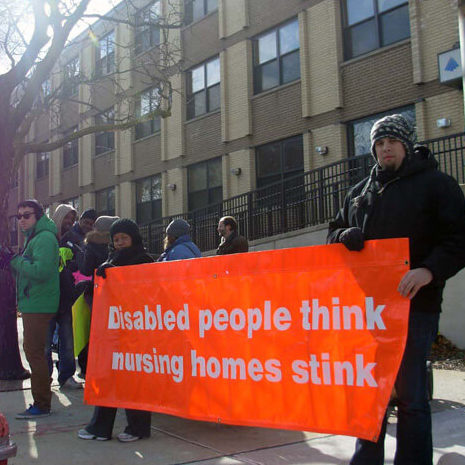Tomorrow, June 22, we at Access Living will remember and celebrate the 20th anniversary of one of the most important civil rights U.S. Supreme Court decisions for people with disabilities in American history.

It’s called Olmstead vs. L.C. and E.W. L.C. stands for Lois Curtis and E.W. stands for Elaine Wilson, the plaintiffs. “Olmstead” was the name of the Governor of the State of Georgia at that time, named in the lawsuit. Olmstead was built on years of work by disability advocates, and marked a huge step toward ending the segregation and exclusion of people with disabilities from the rest of society.
It affirms that people with disabilities have the right to receive state-funded supports and services in the community rather than in institutional settings, and it has changed the lives of thousands of people with disabilities who want to live in their own homes.
Worldwide, countries are moving towards community living for disabled people, inspired by the Olmstead decision and the Americans with Disabilities Act (ADA), which guided part of the formation of the United Nations Convention on the Rights of Persons with Disabilities. Here in Chicago, the service and advocacy work we do every day at Access Living has the spirit of Olmstead at its core.
How Olmstead Influences Our Work
- Access Living is honored to have served as original co-counsel for the Illinois Olmstead lawsuits, Ligas, Williams, and Colbert
- Along with community partners, we are proud to have helped move over 2,500 people with disabilities out of institutional settings and into the community over the last several years under the Colbert consent decree
- Olmstead has sparked important community integration initiatives that Access Living has supported in collaboration with countless allies, such as Money Follows the Person, the Community First Choice Option, the CMS Home and Community Based Settings Rule, and the Disability Integration Act
- We work with a number of community partners like Going Home Illinois who are committed to real systems change to ensure that all people with intellectual/developmental disabilities can be integrated in the community, not segregated in institutions, and ending the PUNS list in Illinois; Going Home advocates made sure that the Illinois legislature honored Olmstead with HR 410, an honorary resolution (see text here)
The History of Olmstead
In addition to the impact Olmstead has today, the story behind the decision is an example of the game-changing contributions women with disabilities, women of color with disabilities, and people with mental health and/or intellectual disabilities have made to the disability rights movement.
The story of the Olmstead case begins with Lois Curtis, an African American woman, and Elaine Wilson, a white woman, who both had mental illness and developmental disabilities, and were voluntarily admitted to the psychiatric unit in the state-run Georgia Regional Hospital. Following the women’s medical treatment there, mental health professionals stated that each was ready to move to a community-based program. Despite these recommendations, Lois and Elaine were denied the opportunity to leave the hospital for several years following the completion of their initial treatment. They filed suit under the ADA, and the U.S. Supreme Court ruled in their favor. They then transitioned to the community. Elaine passed away in 2005 while Lois continues to live in the community with supports, and is an artist and self-advocate. See more about their stories here.
